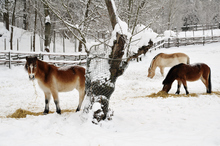Most horse owners know that their horse's hair coat is an important part of the horse's image, health, and comfort. The horse's hair and skin is involved in thermal regulation, sensory perception, and as a barrier to chemical, physical, and microbial injury to the skin.

Meeting cold weather needs of your horses
As the nights become chilly, horse owners need to make sure their horses are protected from the cold, but it is important to realize that not all horses need blankets or heated barns.
Wild horses usually shed their hair only once each year as temperatures warm and they have less need for protection from the elements.
Researchers indicate that domestication with heated barns, blanketing, and rapid changes in geographic location and breeding schedules might cause a change from a single yearly shed as observed in the undomesticated horse, to continuously shedding throughout the year, maintaining a short coat which can be detrimental when cold weather arrives.
Getting Ready for Winter
As the nights become chilly, horse owners need to make sure their horses are protected from the cold. Horse owners that have shows coming up sometimes want to maintain the look of the horse's regular warmer weather coat which can lead to horses being more sensitive to cold weather.
Show horses that have their bodies shaved regularly likely need some type of blanket. Shaving a horse’s normal coat leaves it defenseless against many outside elements and the right blanket can help compensate for this.
According to Mark Russell, assistant professor in the Equine Extension at the University of Arkansas Division of agriculture, horses with very short hair may be the only horses that need to be blanketed during winter weather.
“When it's wet and cold like this, it's OK for a horse to be in a pasture,” Russell said. “They were intended to be outside.” Horses generate lots of heat, kept in by their coats."
“As long as the horse has grown its winter hair, it doesn’t need to wear a blanket outside,” he said, adding that blanketing can backfire. “The blanket actually pushes the hair down, compressing the air spaces and the hair isn't able to insulate the way it's intended.”
If your horse is stressed by a physical problem, you should make sure his environment helps the cause, not hurts it. Don't blanket him so heavily that he is dripping sweat, and don't throw him out into the cold if an illness has debilitated his ability to generate adequate body heat.
Also, don't forget a daily check on your turned-out horses wearing blankets. They can become thin or develop rubs or problems under the blankets that you might not notice without regularly removing the blankets and running your hands all over their bodies.
Research shows that horses wearing blankets and/or stabled in heated barns fail to develop a complete or "full" winter coat.
As the season of blankets and heated barns arrives, horse owners need to be careful not to put their horses in an unhealthy situation. The heating of barns within reason is fine, but not at the expense of adequate ventilation and fire safety.
Also keep in mind that just because the air quality seems fine to you out in the barn aisle, it might not be all that good in a confined stall closer to ground level where your horse's nose spends most of its time. Inattention to adequate ventilation in heated barns (and sometimes even in non-heated barns) can contribute to respiratory problems.
Another area involving hair coats to keep in mind is traveling with horses in trailers. Blanketed horses in a partially closed trailer can generate rather high temperatures in a relatively short time. Stop after 20-30 minutes on the road and check out the situation in the trailer.
The inside trailer temperature is also drastically different between night and day as the sun rises and starts to heat the trailer. Also, for the lucky horses heading south or west from the northeast for the winter, keep an eye on the outside air temperature and adjust the blankets/ windows/vents accordingly, which holds true anytime you are traveling with your horses.
In some cases, winter coats might be an annoyance, but they evolved for a reason. Horse owners need to understand how they work and what makes them grow, and manage them to keep horses comfortable throughout the seasons.
